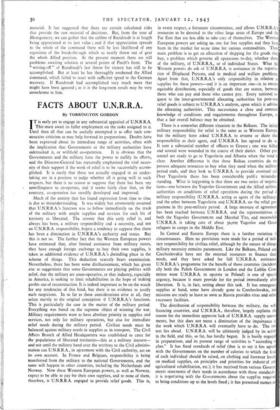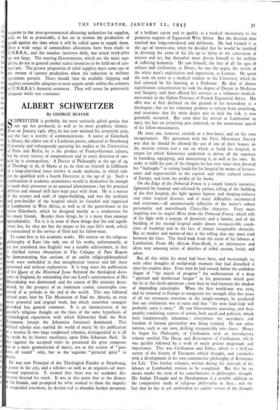FACTS ABOUT U.N.R.R.A.
By TORRINGTON GORDON
IT is early yet to engage in any substantial appraisal of U.N.R.R.A. This must await its fuller employment on the tasks assigned to it. Until then all that can be usefully attempted is to offer such con- structive criticism as may help for-ward its preparations. Doubts have been expressed about its immediate range of activities, often with the implication that Governments or the military authorities have
sidetracked it, or withheld co-operation. It is obvious that the Governments and the military have the power to nullify its efforts, and the Director-General has repeatedly emphasised the vital neces- sity of their support if the work of relief is to be successfully accom- plished. It is rarely that those not actually engaged in an under- taking are in a position to judge whether all is going well in such respects, but there is no reason to suppose that there has been any unwillingness to co-operate, and it seems fairly clear that, on the contrary, co-operation has steadily developed and improved.
Much of the anxiety that has found expression from time to time is due to misunderstanding. It was widely but erroneously assumed that U.N.R.R.A.'s function was to follow immediately on the track of the military with ample supplies and services for each bit of territory as liberated. The answer that this early relief is, and always has been, a military responsibility and a necessity, and not an U.N.R.R.A. responsibility, begets a tendency to suppose that there has been a diminution in U.N.R.R.A.'s authority and status. But this is not so. The further fact that the Western European powers have estimated that, after limited assistance from military stores, they have enough foreign exchange to,buy their own supplies, is taken as additional evidence of U.N.R.R.A.'s dwindling place in the scheme of things. This deduction scarcely bears examination. Nevertheless, there has been some disillusionment, which has given rise to suggestions that some Governments are playing politics with relief, that the military are unto-operative, or that industry, especially in America, is seeking to limit rehabilitation in the hope of making profits out of reconstruction. It is indeed important to be on the watch for any tendencies of this kind, but there is no evidence to justify such suspicions. In so far as these considerations arise at all, they relate mainly to the original conception of U.N.R.R.A.'s functions. This is particularly the case in the matter of the military period. Everything was based on the supreme object of winning the war. Military requirements were to have absolute priority in supplies and services, not only for military operations, but also for immediate relief needs during the military period. Civilian needs must be balanced against military needs in supplies as in transport. The Civil Affairs Branch of Allied Headquarters was established to cater for the populations of liberated territories—this as a military interest— and not until the military hand over the territory to the Civil adminis- tration can U.N.R.R.A., in agreement with the Civil authority, act on its own account. In France and Belgium, responsibility is being transferred from the military to the national Governments, and the same will happen in other countries, including the Netherlands and Norway. Now these Western European powers, as well as Norway, expect to be able to pay for their own supplies, and to none of them, therefore, is U.N.R.R.A. engaged to provide relief goods. This is, in every respect, a fortunate circumstance, and allows U.N.R.R.A.'s resources to be devoted to the other large areas of Europe and the Far East that are less able to take -care of themselves. The Western European powers are asking no one for free supplies and they have been in the market for some time for various commodities. Their main problem is to get an allocation of shipping for the goods they buy, a problem which governs all operations to-day, whether those of the military, of U.N.R.R.A., or of individual States. What the Western powers do ask of U.N.R.R.A. is assistance in the repatria- tion of Displaced Persons, and in medical and welfare problems. Apart from that, U.N.R.R.A.'s only responsibility in relation to supplies for these powers—and it is an important one—is to ensure equitable distribution, especially of goods that are scarce, between those who can pay and those who -cannot pay. Every national re- quest to the inter-governmental allocating authorities for post-war relief goods is subject to U.N.RR.A.'s analysis, upon which it advises the allocating authorities. This necessitates a close and constant knowledge of conditions and requirements throughout Europe, so that a fair overall balance may be obtained.
There is a somewhat different situation in the Balkans. The initial military responsibility for relief is the same as in Western Europe, but the military have asked U.N.R.R.A. to assume or share that responsibility as their agent, and U.N.R.R.A. has agreed to do so. It sent a substantial number of officers to Greece ; one was killed and several were wounded in the course of their duties. Other per- sonnel are ready to go to Yugoslavia and Albania when the road is clear. Another difference is that these Balkan countries do no possess adequate resources to buy what they need when the military period ends, and they look to U.N.R.R.A. to provide eventual aid Over Yugoslavia there has been considerable pubic misunder- standing. What is happening is that there are two series of negotia- tions—one between the Yugoslav Government and the Allied military authorities on conditions• of relief operations during the period of military responsibility (U.N.R.R.A. acting as agent of the military), and the other between Yugoslavia and U.N.R.R.A. on the relief pro- gramme in the post-military period. . A large• measure of agreement has been reached between U.N.R.R.A. and the representatives of both the Yugoslav Government and Marshal Tito, and meanwhile U.N.R.R.A. is taking care of about so,000 Yugoslav and Greek refugees in camps in the Middle East.
In Central and Eastern Europe there is a further variation of circumstances. Here no provisions were made for a period of mill-
Lary responsibility for civilian relief, although by the nature of things, military necessity remains paramount. Like the Balkans, Poland and
Czechoslovakia have not the external resources to finance their needs, and they have asked for full U.N.R.R.A. assistance U.N.R.R.A.'s programme for the benefit of those countries (incident ally both the Polish Government in London and the Lublin Com
mittee want U.N.R.R.A. to operate in Poland) is one of special urgency, because it must provide for the period immediately after
liberation. It is, in fact, setting about this task. It has emergency supplies at hand, some have already gone to Czechoslovakia, and missions are ready to leave as soon as Russia provides visas and whet necessary facilities.
The distribution of responsibility between the military, the self- financing countries, and U.N.R.R.A., therefore, largely explains the
reason for the immediate apparent lack of U.N.R.R.A. supply move ments, but this does not mean a diminution of the importance of the work which U.N.R.R.A. will eventually have to do. The real test lies ahead. U.N.R.R.A. will be ultimately judged by its action in the field, and this, so far, has hardly begun. It is busily engaged in preparations, and its present range of activities is " according plan." It has fixed standards of relief (that is to say it has agreed with the Governments on the number of calories to which the food of each individual should be raised, on clothing and footwear levels, on medical supplies, on principles and priorities for industrial and agricultural rehabilitation, etc.); it has received from various Govern- ments statements of their needs in accordance with those standards it is negotiating with the Governments about the supplies required to bring conditions up to the levels fixed ; it -has presented* numerous requests to the inter-governmental allocating authorities for supplies, and, so far as practicable, it has set in motion the production of goods against the time when it will be called upon to supply them. Over a wide range of commodities allocations have been made to U.N.R.R.A., and the number increases daily, but actual stock-piles are not large. The warring Governments, which are the main sup- pliers, do not in general permit scarce resources to be held out of cur- rent use. The greater proportion of relief supplies must come out of the stream of current production when the reduction in military operations permits. There should then be available shipping and supplies reasonably adequate to meet urgent deeds within the compass of U.N.R.R.A.'s financial resources. They will never be generously adequate while war continues.























 Previous page
Previous page